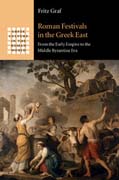
Roman Festivals in the Greek East: From the Early Empire to the Middle Byzantine Era
Graf, Fritz
This study explores the development of ancient festival culture in the Greek East of the Roman Empire, paying particular attention to the fundamental religious changes that occurred. After analysing how Greek city festivals developed in the first two Imperial centuries, it concentrates on the major Roman festivals that were adopted in the Eastern cities and traces their history up to the time of Justinian and beyond. It addresses several key questions for the religious history of later antiquity: who were the actors behind these adoptions? How did the closed religious communities, Jews and pre-Constantinian Christians, articulate their resistance? How did these festivals change when the empire converted to Christianity? Why did emperors not yield to the long-standing pressure of the Church to abolish them? And finally, how did these very popular festivals - despite their pagan tradition - influence the form of the newly developed Christian liturgy? INDICE: Part I. Festivals in the Greek East Before Constantine: 1. Greek city festivals in the Imperial age; 2. Roman festivals in Eastern cities; Part II. Roman Festivals in the Greek East After Constantine: 3. Theodosius' reform of the legal calendar; 4. Contested festivals in the fourth century; 5. The Lupercalia from Augustus to Constantine Porphyrogennetos; 6. John Malalas and ritual aetiology; 7. The Brumalia; 8. Kalendae Ianuariae again, and again; 9. Christian liturgy and the Imperial festival tradition; Part III. Christianity and Private Ritual: 10. Christian incubation; 11. Magic in a Christian Empire; Epilogue. The persistence of festivals and the end of sacrifices.
- ISBN: 978-1-107-09211-2
- Editorial: Cambridge University Press
- Encuadernacion: Cartoné
- Páginas: 380
- Fecha Publicación: 05/11/2015
- Nº Volúmenes: 1
- Idioma: Inglés
